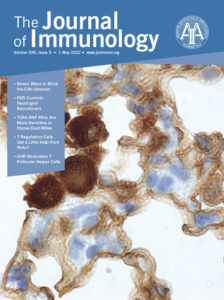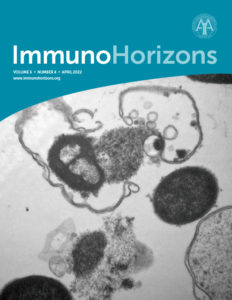Sunday, May 8, 2022 12:30 PM – 2:30 PM ET Room B110–112
Innate Signaling, Microbiome, and Metabolism in Autoimmunity
Chairs
- Leah Kottyan, Cincinnati Children’s Med. Ctr.
- Betsy Barnes, The Feinstein Inst. for Med. Res., Northwell Hlth.
Speakers
- Bharati Matta, Feinstein Inst. for Med. Res., IRF5 risk variants contribute to pre-symptomatic SLE by enhancing the levels of circulating NET antigens
- Morgan Lee Terrell, Univ. of Florida, Treatment with TLR7/8 agonist compromises intestinal epithelium integrity in a lupus prone mouse model
- Kevin MingJie Gao, Univ. of Massachusetts Med. Sch., Radioresistant cells in STING gain-of-function mice initiate lymphocyte dependent lung inflammation and IFNγ dependent mortality
- David Nemazee, Scripps Res. Inst., Cleavage of DNA and RNA by PLD3 and PLD4 limits autoinflammatory triggering by multiple sensors, including endolysosomal TLRs and a STING dependent sensing pathway
- Mitra Padideh Maz, Univ. of Michigan, Understanding innate immune cell-mediated inflammation in UV-induced skin injury in lupus-prone mice
- William J. Turbitt, Univ. of Alabama at Birmingham, Neutrophil-specific Socs3 deficiency induces brain-targeted experimental autoimmune encephalomyelitis with enhanced cerebellar neutrophil activation
- Shailesh K. Shahi, Univ. of Iowa, HLA Class II polymorphisms influence gut microbiota composition and modulate disease in transgenic mice model of multiple sclerosis
- Mary A. Markiewicz, Univ. of Kansas Med. Ctr., The role of NKG2D signaling in NOD diabetes is affected by the microbiota



